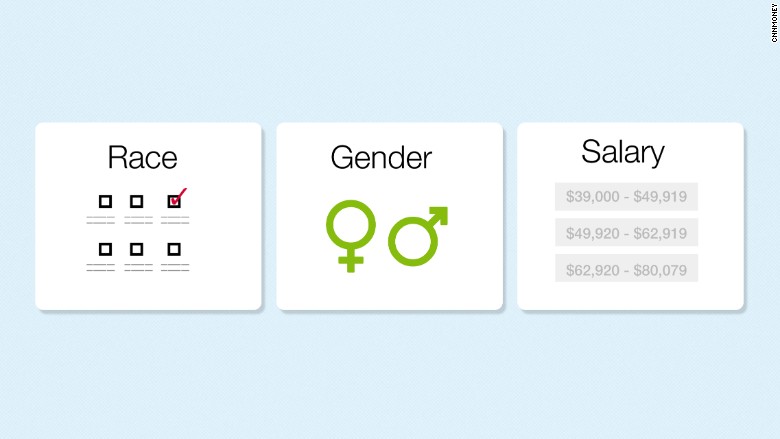
In an effort to help prevent wage discrimination, the federal government may soon require employers to report how much they are paying their employees by race, ethnicity and gender.
President Obama announced a proposal last week that would require companies and federal contractors with more than 100 employees to report race and gender data across 12 different salary ranges to the Equal Employment Opportunity Commission. The data would include nearly 63 million employees, from those making less than $19,239 to those making more than $208,000.
But not everyone thinks it's a good idea.
Blair Robinson, a partner at Morgan Lewis, a law firm that represents companies in employment discrimination cases, said the proposal would require companies to share more information about compensation with the government than ever before.
Robinson said the data could lead to "misleading" interpretations of how a company pays its employees because employers would have to fit specific job titles like "marketing manager" or "finance manager" into very broad job categories like "first/mid level officials and managers." Each of those jobs could have very different salaries that have nothing to do with race or gender, Robinson said.
Related: Working while brown: What discrimination looks like now
And employees with the same job title may be paid differently because they have different levels of experience, tenure or performance reviews, Robinson noted. "There are all sorts of factors that are not discriminatory that might explain pay, but that's not getting picked up in this reporting," he added.
Compensation decisions should be based on an employee's "merit, qualifications, and contributions to his or her employer," and not on an employee's race, ethnicity or gender, Randy Johnson, the senior vice president of Labor, Immigration and Employee Benefits at the U.S. Chamber of Commerce, said in a statement.
"While we strongly support nondiscrimination in compensation, the type of reporting proposed by the administration today would place unnecessary and onerous burdens on employers while providing no meaningful insight as to whether employer pay practices are discriminatory," Johnson said.

However, the Labor Department argues that the data will give it a more powerful tool to do its enforcement work. "We can't deliver on the promise of equal pay unless we have the best, most comprehensive information about what people earn," Secretary of Labor Thomas E. Perez said in a statement.
The first batch of aggregate data is expected to be available in September 2017.
The proposal is part of a larger effort by the Obama administration to address wage discrimination. Seven years ago, Obama signed The Lilly Ledbetter Fair Pay Act, which loosened the statute of limitations under which workers can sue employers for pay discrimination based on gender, race, age or disability. Under that law, workers can file unfair pay complaints within 180 days after receiving a paycheck they believe is discriminatory.
According to Census Bureau data, the average woman who works full time earns 79 cents for every dollar a man earns. That gap is worse for Hispanic and black women who earn 55 cents and 60 cents, respectively, to every dollar a man earns.
Related: Why the racial wealth gap won't go away
Since 2010, the EEOC said it has obtained more than $85 million from discrimination lawsuits and settlements on behalf of employees who said they had faced pay discrimination based on sex. (A comparable figure was not immediately available for those who said they had faced pay discrimination based on race.)
Adam Klein, a partner at Outten & Golden, a law firm that specializes in discrimination cases, said that pay discrimination is often masked by things like occupational segregation and employee evaluations. For example, a supermarket may only hire women as cashiers and men as stock room employees, and pay cashiers less than those in the stock room, even though they are both considered low-skilled jobs.
An employer may also base an employee's salary on their wages at a previous job instead of the salaries of their peers at a new job, thus perpetuating a cycle of paying certain employees less than others. In work evaluations, particularly in white collar industries like finance, employers may be more likely to tie bonuses to hard metrics like sales figures as opposed to soft skills like being a good negotiator.
"Women are just systematically undervalued in terms of their performance," Klein said. "The more objective hard data there is, the worse women are."
